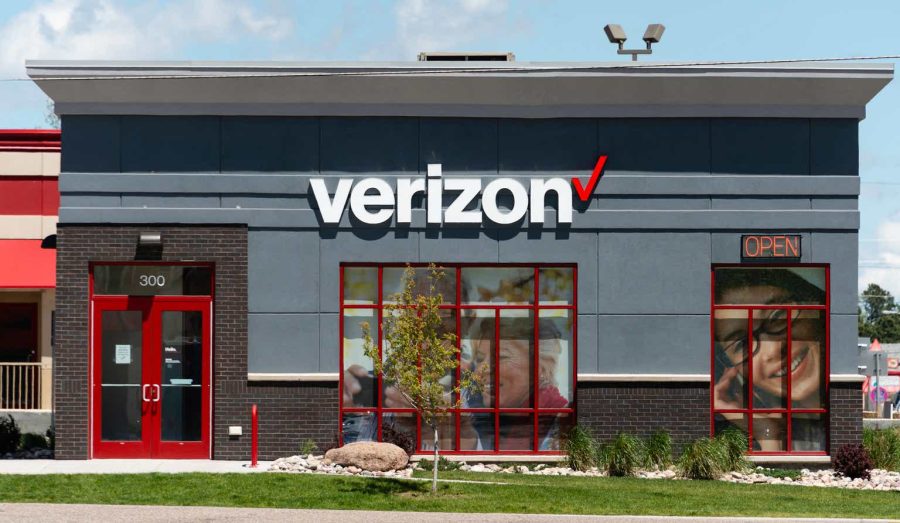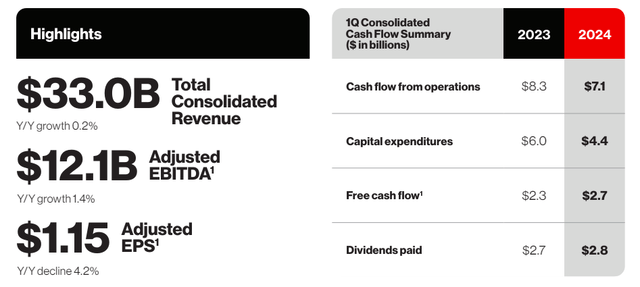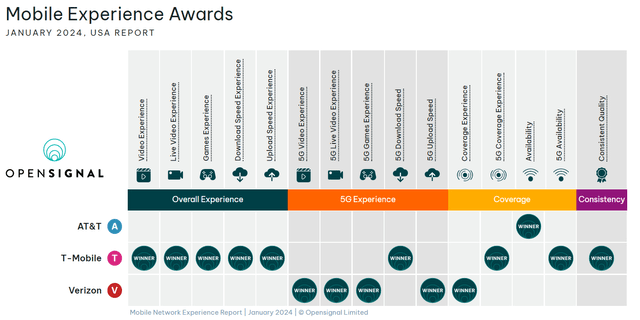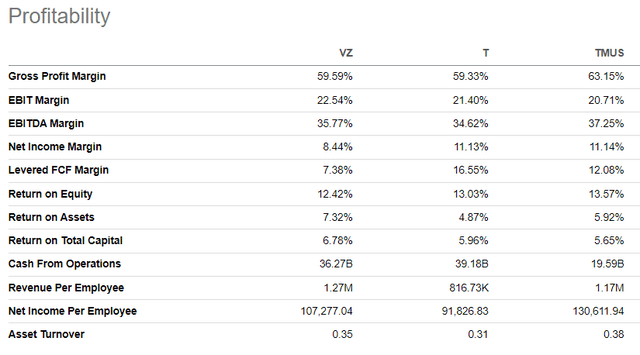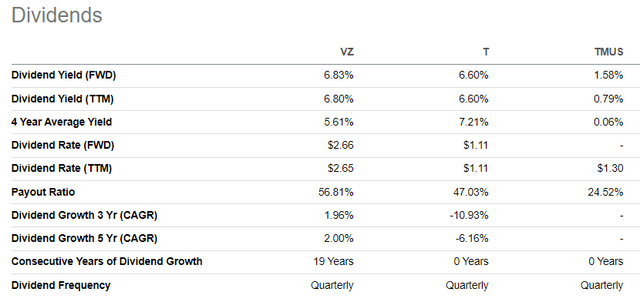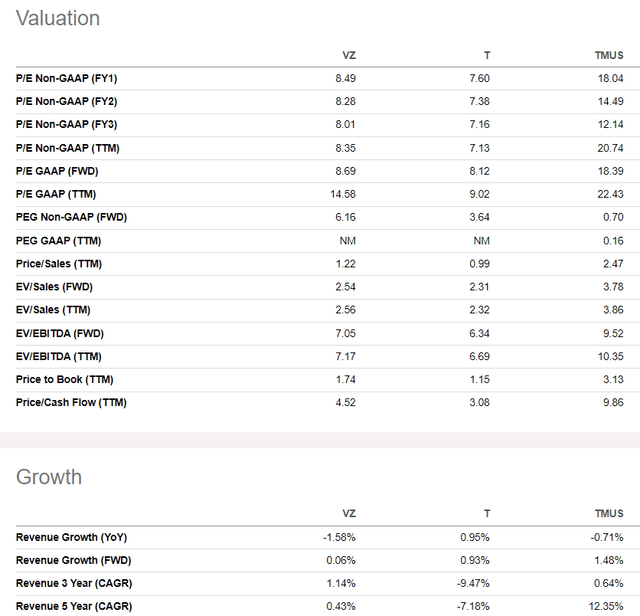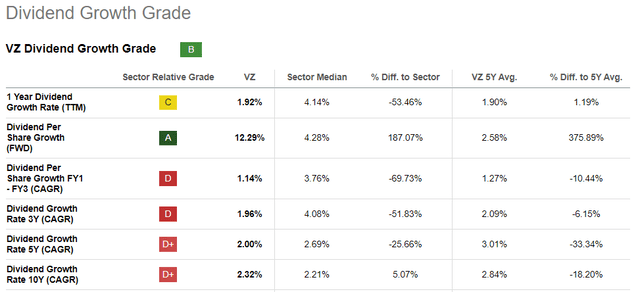Summary:
- Verizon’s Q1 performance showed positive trends, including a positive EPS surprise and a 1.4% growth in non-GAAP EBITDA.
- Moderating CapEx and improving free cash flow indicate improved dividend safety and future growth probability.
- Verizon’s dividend yield and growth record are the best-in-class among the three largest U.S. telecom players.
- My valuation analysis suggests the stock is around 41% undervalued.
RiverNorthPhotography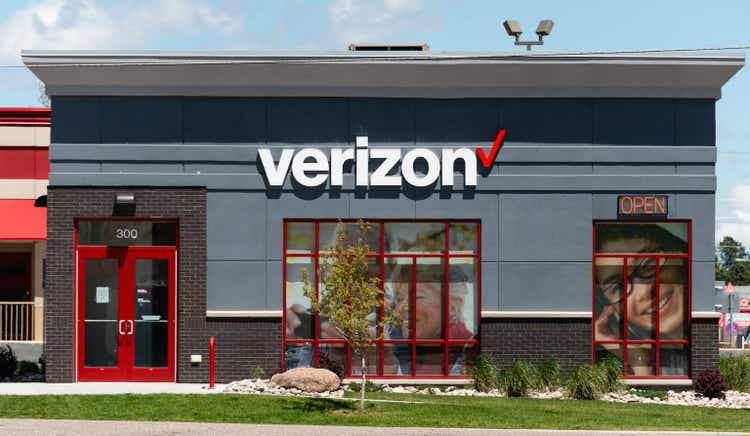
Introduction
I had a ‘Strong Buy’ thesis about Verizon (NYSE:VZ) in February and the stock’s total return was behind the S&P 500 since the article was published at Seeking Alpha. Despite VZ demonstrating weaker performance than the broad U.S. market, I view developments positively. The company’s management continues to demonstrate a holistic approach to developing the business, balancing between improving operating metrics and cost discipline. Additionally, the management’s sound capital allocation approach is another reason why I believe the stock’s high dividend yield is safe and poised to demonstrate modest but stable growth. The stock is around 41% undervalued, which makes me reiterate my ‘Strong Buy’ rating for VZ.
Fundamental analysis
Verizon’s latest earnings release add to my optimism, as I observed several positive trends in the company’s performance in Q1. The company delivered a positive EPS surprise despite a slight miss in revenue, with revenue remaining almost perfectly flat on a year-over-year basis. The non-GAAP EPS shrank on a YoY basis from $1.20 to $1.15, mainly due to a $428 million increase in interest expense, which I consider a temporary headwind due to the tight stance of the U.S. monetary policy. A positive sign indicating improved operating efficiency at Verizon is a 1.4% growth in adjusted EBITDA. While some may consider this improvement modest, I view any expansion in EBITDA to be positive, especially considering flat revenue.
Another positive trend for investors is the moderation of CapEx as a result of greater progress in the 5G network build out. According to the company’s cash flow statement, CapEx decreased by 27% on a YoY basis, positively impacting free cash flow. With EBITDA demonstrating improvements, stabilization of debt levels, and CapEx decreasing, I think that the dividend’s safety and its future growth probability is improving.
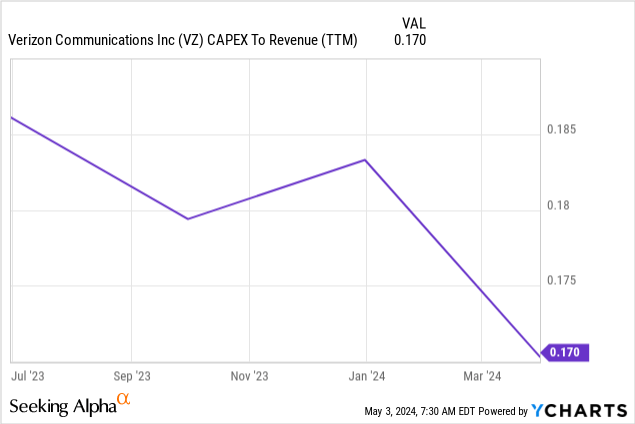
The company’s revenue is growing slow because of a nearly 100% telecom penetration in the U.S., and the entire industry is experiencing subtle growth. Verizon operates in a very mature oligopoly, where key customer metrics are crucial for success, as healthy consumer metrics are highly likely to prevent expanding churn rates. Therefore, I consider Q1’s 1.4% YoY growth in wireless retail postpaid and a 5.3% YoY growth in consumer wireless retail postpaid gross adds to be a solid indication of the business expanding its footprint. Verizon’s churn rates also improved on a sequential basis, with wireless retail postpaid churn decreasing from 1.18% to 1.15% and wireless retail postpaid phone churn from 0.93% to 0.90%. The churn rate dynamic looks quite positive and adds optimism to me. Favorable trend in Verizon’s consumer metrics appears justified as the company provides an unmatched 5G experience, according to opensignal.com.
The management’s holistic approach to develop both the top and bottom lines can be seen by its better than competitors’ ROE and ROA metrics, which reflect the efficiency of assets and capital employed. I would also like to emphasize that VZ has strong per employee metrics, meaning that the company efficiently manages its headcount.
To sum up, recent trends in Verizon’s performance add a lot of optimism to me because key business metrics demonstrate positive trends and EBITDA expansion suggests that the management’s cost-saving initiatives are efficient. Since Verizon appears to be at the forefront of the 5G experience quality, I believe that higher uptake rates compared to competitors will be fair over the long term.
Closing out the list, the current situation in the stock market is likely to favor strong dividend players like VZ. As Q1 earnings season continues, we see that almost none of the biggest growth stocks spiked after their earnings releases. This might indicate that investors consider expectations around growth stocks to be overheated and a rotation to safer stocks is likely to occur. Despite achieving almost full penetration, I believe the telecom industry to be a safe haven given that we all use our devices, which are useless without connection between each other. And among telecom names, VZ provides the highest dividend yield and its dividend growth record is far better compared to AT&T (T), which offers approximately comparable dividend yield. T-Mobile’s (TMUS) dividend yield is not even close to VZ and T.
Valuation analysis
As it is widely known, there are three major telecom players in the U.S.: Verizon, AT&T and T-Mobile. Therefore, I want to start my valuation analysis by comparing VZ’s ratios to its closest peers.
Verizon’s valuation ratios are significantly lower compared to TMUS, despite about the same revenue dynamic over the last three years. The fact that Verizon’s valuation ratios are higher compared to T appears to be fair, given that T’s revenue recorded a -9.5% revenue CAGR over the last three years. It is also worth mentioning that most of Verizon’s profitability ratios are better compared to T. Therefore, peer valuation ratio analysis suggests that Verizon is attractively valued.
Calculated by the author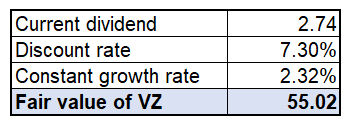
To determine VZ’s fair share price, I implement a dividend discount model (“DDM”) with a 7.3% cost of equity as a required rate of return. FY 2025 dividend is expected by consensus to be $2.74. According to Seeking Alpha, the last decade’s dividend CAGR is 2.32% which appears to be a fair assumption for my DDM calculations.
My DDM calculations suggest that VZ’s fair share price is $55, far above the current $39 share price. That said, the current share price is attractive and there is a 41% upside potential.
Mitigating factors
Verizon’s substantial indebtedness is likely to be a red flag for risk-averse investors. The company’s total debt is $181 billion, higher than the company’s market cap. I am highly confident that VZ is able to serve its debt obligations given stability in revenues coupled with capital allocation and cost discipline. However, it will likely take several quarters before we see a notable deleveraging. This factor might be dragging on the stock’s price in its path towards its fair value. That said, VZ’s solid upside potential might be locked until the market sees significant improvement in the company’s leverage.
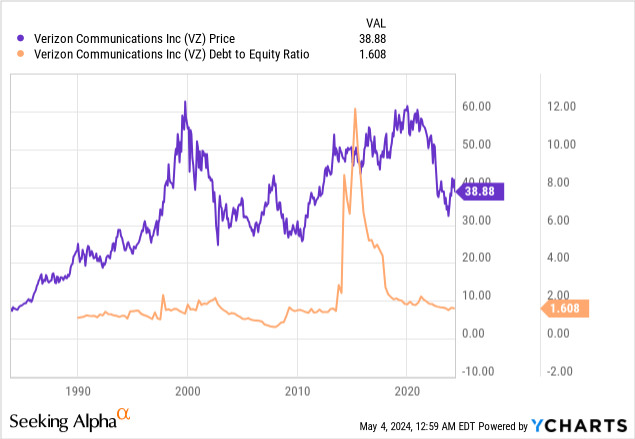
Since VZ serves millions of users and possesses sensitive data of users, there is always a risk of the data leakage or illegal sharing of it. If this is the case, any data leakage might lead to substantial fines from authorities and also carry substantial reputational risks for VZ. For example, just recently the company was fined for a total of $47 million for illegally sharing location data of users. Operating in an oligopoly also means that Verizon’s operations are under thorough scrutiny from various governmental bodies, which means elevated risks of new charges.
Conclusion
Verizon appears to remain a ‘Strong Buy’, especially considering its 41% upside potential. The stock currently offers the best-in-class dividend yield of 6.83%, which is still growing. The company’s operating performance is improving, and high-interest rates are the only factor that weighs on the bottom line, but it is temporary. The management is disciplined in terms of capital allocation and costs, which means that the dividend is highly likely safe and poised to continue growing approximately in line with historical inflation rates.
Analyst’s Disclosure: I/we have a beneficial long position in the shares of VZ either through stock ownership, options, or other derivatives. I wrote this article myself, and it expresses my own opinions. I am not receiving compensation for it (other than from Seeking Alpha). I have no business relationship with any company whose stock is mentioned in this article.
Seeking Alpha’s Disclosure: Past performance is no guarantee of future results. No recommendation or advice is being given as to whether any investment is suitable for a particular investor. Any views or opinions expressed above may not reflect those of Seeking Alpha as a whole. Seeking Alpha is not a licensed securities dealer, broker or US investment adviser or investment bank. Our analysts are third party authors that include both professional investors and individual investors who may not be licensed or certified by any institute or regulatory body.
